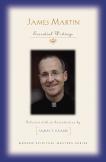Father James Martin's guide to holy places and people
Following an excellent biographical sketch of the Catholic spiritual writer James Martin, S.J., James T. Keane’s splendid collection of Martin’s essential writings is grouped into four categories: the spiritual life, finding God in all things, solidarity with those who suffer and life with the saints. It becomes immediately clear why Martin is so beloved by American Catholics. His writing is accessible and grounded in narratives from real life. He is strikingly honest about himself, and he boldly advocates for the marginalized and persecuted, including gays and lesbians. While he can be unflinchingly critical of the church’s flaws, Martin is nevertheless clearly devoted to the church and upholds the church as the principal means through which the people of God can become holy.
Martin describes holiness as becoming more of one’s true self. This is not something we receive passively and vicariously from sacraments, priests and saints. Rather, like salmon working their way up current, the people of God are on a life-long journey and everyone has a responsibility to stay the course. Following St. Ignatius Loyola, Martin believes that God is larger than the church, and pilgrims should be alert to his presence in material things like the birth of a child or Christmas shopping in a busy mall, and in personal experiences, including even physical suffering and doubt. Finally, Martin tells us that God is to be found particularly in the means provided by the church and her traditions. From his imaginative riffs on Jesus, Mary and Joseph to his openness to the supernatural power at holy places like Lourdes and Chimayo, and then to his accounts of the distinct personalities and foibles of the saints, Martin reminds us that the church is not merely a mediator of holiness but is also a reservoir of holy places and holy human exemplars.
This article also appeared in print, under the headline “A guide to holy places and people,” in the July 24,2017, issue.








